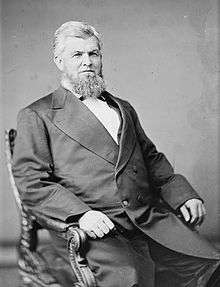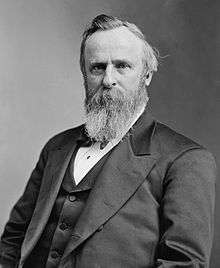David M. Key
| David Key | |
|---|---|
 | |
| Judge of the United States District Court for the Eastern District of Tennessee | |
|
In office May 27, 1880 – January 21, 1895 | |
| Appointed by | Rutherford B. Hayes |
| Preceded by | Connally Trigg |
| Succeeded by | Charles Dickens Clark |
| Judge of the United States District Court for the Middle District of Tennessee | |
|
In office May 27, 1880 – January 21, 1895 | |
| Appointed by | Rutherford B. Hayes |
| Preceded by | Connally Trigg |
| Succeeded by | Charles Dickens Clark |
| 27th United States Postmaster General | |
|
In office March 12, 1877 – June 2, 1880 | |
| President | Rutherford B. Hayes |
| Preceded by | James Tyner |
| Succeeded by | Horace Maynard |
| United States Senator from Tennessee | |
|
In office August 18, 1875 – January 19, 1877 | |
| Preceded by | Andrew Johnson |
| Succeeded by | James E. Bailey |
| Personal details | |
| Born |
David McKendree Key January 27, 1824 Greeneville, Tennessee, U.S. |
| Died |
February 3, 1900 (aged 76) Chattanooga, Tennessee, U.S. |
| Political party | Democratic |
| Spouse(s) | Elizabeth Lenoir |
| Education |
Hiwassee College (BA) University of Tennessee, Knoxville (MA) |
| Military service | |
| Allegiance |
|
| Service/branch |
|
| Rank |
|
| Unit |
|
| Battles/wars | American Civil War |
David McKendree Key (January 27, 1824 – February 3, 1900) was a Democratic U.S. Senator from Tennessee from 1875 to 1877 as well as the U.S. Postmaster General under President Hayes, and a United States federal judge.
Biography
Key was born in Greene County, Tennessee, the son of Reverend John and Margaret (Armitage) Key. In 1826 the family moved to Monroe County where Key was reared, graduating from Hiwassee College in 1850. He selected the legal profession as his vocation through life, and the same year of his graduation he read law to be admitted to the bar. He practiced law for two years at Madisonville, then worked for a short time in Kingston. He moved to Chattanooga in February 1853. He married Elizabeth Lenoir in 1857, and fathered nine children.
When the Civil War broke out, Key enlisted in the Forty-third Confederate Tennessee Regiment of Infantry, served until the close of the war, and was mustered out as a lieutenant colonel. He then resumed the practice of law in Chattanooga until 1868.
Key was a member of the Tennessee state constitutional convention of 1870, which composed the basic instrument of government of the state still in effect. In August of the same year, he was elected chancellor of the Chattanooga (3rd) division, defeating the Republican incumbent, Daniel C. Trewhitt. He maintained his chancellorship during an unsuccessful campaign for the U.S. House in 1872, but resigned in 1875 to accept the appointment by Tennessee Governor James D. Porter to the vacant Senate seat created by the death of Andrew Johnson.
Defeated in the next senate election in the Tennessee General Assembly, Key was appointed Postmaster General in 1877 by President Hayes, and served until August 25, 1880. His appointment as Postmaster General was part of the Compromise of 1877, implemented to ensure there was Democratic power in the Republican cabinet. Key's work as Postmaster General is harshly criticized by Mark Twain in The Autobiography of Mark Twain.
On May 19, 1880, Key was nominated by President Hayes to a joint seat on the United States District Court for the Middle District of Tennessee and the United States District Court for the Eastern District of Tennessee, vacated by Connally F. Trigg. Key was confirmed by the United States Senate on May 27, 1880, and received his commission the same day. Key retired from the bench on January 21, 1895. He died in Chattanooga in 1900 and is buried there.
See also
References
- United States Congress. "David McKendree Key (id: K000156)". Biographical Directory of the United States Congress. Retrieved on 2008-02-13.
- David McKendree Key at the Biographical Directory of Federal Judges, a public domain publication of the Federal Judicial Center.
- Goodspeed Publishing, History of East Tennessee, Hamilton County. (1887)
- Dictionary of American Biography
- Abshire, David. The South Rejects a Prophet: The Life of David Key. New York: F.A. Praeger, 1967.
- Murrin, John M. Liberty, Equality, Power. Fourth Edition. Australia: Thomson Wadsworth, 2005.
| U.S. Senate | ||
|---|---|---|
| Preceded by Andrew Johnson |
U.S. Senator (Class 1) from Tennessee 1875–1877 Served alongside: Henry Cooper |
Succeeded by James E. Bailey |
| Political offices | ||
| Preceded by James Tyner |
United States Postmaster General 1877–1880 |
Succeeded by Horace Maynard |
| Legal offices | ||
| Preceded by Connally Trigg |
Judge of the United States District Court for the Eastern District of Tennessee 1880–1895 |
Succeeded by Charles Dickens Clark |
| Judge of the United States District Court for the Middle District of Tennessee 1880–1895 | ||


